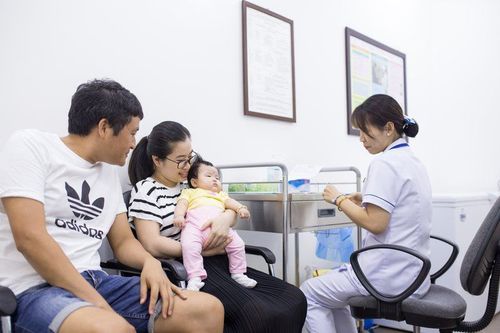This is an automatically translated article.
HIB is a bacteria that causes respiratory illness and even meningitis. When HIV infection in young children can lead to death. Therefore, a vaccine is needed to prevent the risk of disease in young children. Let's learn about Act HIB drugs to know the uses and indications of the product.1. What is Act HIB drug?
Children 2 months to 5 years old will need Act HIB medication. This medicine may come into contact with bacterial proteins, causing the body to produce antibodies against them. However, vaccines do not treat the infection or fight other types of flu that cause illness. As with many current vaccines, the potency and range of activity will vary from person to person.2. Warning before using the drug
Act HIB is for children, so care should be taken to avoid allergic reactions to its ingredients. When a child has ever had an allergic reaction to one of the vaccines such as tetanus, meningococcal meningitis, an allergy to haemophilus B may occur. Children allergic to vaccines will not be able to get the shot to avoid danger. Children who are immunosuppressed due to an incurable disease such as cancer or a physical disease or have a history of seizures should not receive this medicine. Some pediatric patients can still be injected after monitoring, but you need to consult more carefully with your doctor to decide to use.3. Note about the dose of Act HIB . drug
Most vaccines are administered intramuscularly, so it is necessary to bring the child to the vaccination center to ensure the quality of the drugs and equipment. The Act HIB vaccine will not be a single shot, but will be combined with many others. Doctors offer a method of pooling into 5in1 or 6in1 to limit the number of injections to help children not be uncomfortable. After the first injection, a booster shot will be performed from about 4-6 months depending on the health conditions of each child. But parents need to pay attention to the baby's first nose before the baby turns 6 weeks old.At some medical centers, when the injection schedule is near, they will notify by phone so that parents can arrange to take their children for injections. You can also make a note of your doctor's appointment to make sure your child gets the correct dose of vaccines. When your baby is over 7 months old and has not received all the necessary shots, you need to notify the doctor. After injection, symptoms of fever or pain may appear. You need to pay attention to the child for 3-5 days to follow up. If there are signs of convulsions or seizures, they should be taken to the hospital immediately.
Vaccines play a role in preventing and mitigating the danger when children attack bacteria. Some objective circumstances may affect the child's vaccination schedule. You need to give your child the correct injection as soon as possible so that the body can generate immunity to protect health. Always make sure your baby gets all the essential vaccines he needs during the first 2 years so his body can produce enough antibodies to fight off environmental pathogens. Overdose usually does not occur with vaccines because only 1 dose at a time and not 2 consecutive doses when there is not enough time.
4. Some side effects of Act HIB . drugs
Before and after vaccination, there may be some unpleasant symptoms in children. You should pay attention to allergic manifestations such as hives, swelling of the face, sore throat or difficulty breathing. After the injection, the child may have a fever for the first 36 hours, so it is necessary to add water to prevent the child from losing electrolytes. Some conditions have put the baby at risk of seizures, crying for hours, even with a high fever. In case the child has a fever, the doctor will instruct the family to give the baby milk or water and use pain relievers to reduce the fever. In some children, swelling at the injection site should be noted and reported to the doctor. If children are anorexic, they can consult a nutritionist.5. Drugs that cause interactions
Currently, vaccination centers have specific information about each dose. However, if your child is taking certain medications, talk to your doctor about it. Certain medications, such as steroids, cancer treatments, psoriasis medications, arthritis medications, immunomodulators, or anti-rejection drugs after transplant surgery, weaken the immune system. At the same time, children should not be vaccinated while taking one of the above medicines.Act HIB is a vaccine that is given to infants and young children. Most babies get the full dose of this vaccine during the first 2 years of life. Vaccines may be affected by certain prescription drugs or vitamins. Drug interactions have not been found yet. When giving your child any vaccine, you should tell the doctor your medical history and the prescription you are taking to consider the safety of the child.
Please dial HOTLINE for more information or register for an appointment HERE. Download MyVinmec app to make appointments faster and to manage your bookings easily.













